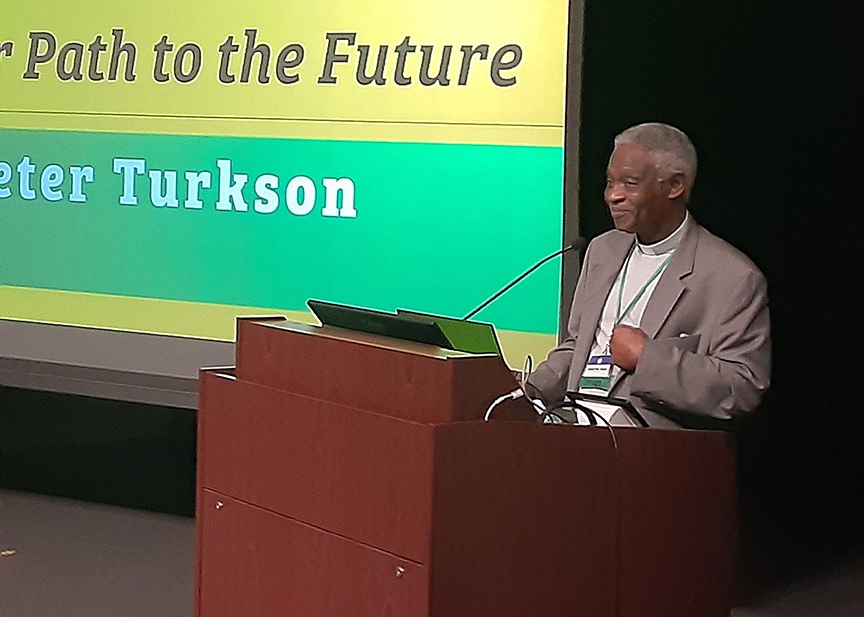
LINTHICUM HEIGHTS, Md. The spirit of the Second Vatican Council that called for renewal of Church life and wider Church engagement with the world continues today, inviting the faithful to serve the common good, Cardinal Peter Turkson, a Vatican official, told a national priests’ assembly.
Such ongoing renewal requires accepting a “mandate to change” rather than to be rooted in practices that restrict the full development of each person, Cardinal Turkson, chancellor of the Pontifical Academy of Sciences and the Pontifical Academy of Social Science, said June 22 during the annual gathering of the Association of U.S. Catholic Priests.
The Vatican official’s presentation to the 200 priests, women religious and others in attendance stressed several ways that Pope Francis is carrying out the spirit of Vatican II by promoting outreach to the margins of society and inviting each member of the Church to be a “protagonist” and “co-creator” in the world.
“Humanity has a mandate to change, to build,” the cardinal said.
Formed in 2011, the AUSCP is an organization of about 500 priests who are inspired by the Vatican II’s teachings and the pope’s call to synodality in the Church.
Cardinal Turkson said the 16 documents produced by the council, which met from 1962 to 1965, provide the framework for the Church to engage the world and shape it to God’s vision of justice and peace in the context of local communities.
“The council aims at planting the seeds of the Gospel in local churches by translating the Christian message in the language and cultural values of the local people,” he explained.
The cardinal invited the priests, working with the lay faithful, to review the documents and to carry out the Holy Spirit’s work in the world. Pope Francis, he added, has rooted his papacy in the conclusions offered in the council’s documents, looking to build bridges across gaps that keep people separated, hurting and ignored.
In calling for the council more than 60 years ago, St. John XXIII desired that the Church open a window so the outside could see in and the Church could look out at the world, Cardinal Turkson explained.
At the time, St. John also wanted to see the Church grow and change, and Cardinal Turkson contrasted that vision by using the metaphor of the mixing of old and new wine together – allowing for traditional practices to be infused with new ideas and visions for the future.
The spirit of Vatican II led St. Paul VI to institute the extraordinary Synod of Bishops to examine “the signs of the times” and “provide a deeper interpretation of divine designs and the constitution of the Catholic Church in order to foster the unity and cooperation of bishops around the world with the Holy See,” he said.
Cardinal Turkson pointed to various synods over the years including those called by Pope Francis to explore young people’s faith and their gifts, the Amazon region and, more recently, synodality, which is scheduled for fall 2023.
He described Pope Francis’ efforts to seek dialogue and understanding as one that will lead to a better future for all of humanity.
“It is the path of the discovery of humanity as endowed with a gift of closeness to God, which bestows on each a dignity of a relational being which does not only bind us together as a people with a memory and a soul, but also makes us responsible for the common good. It is, therefore, the path of the fraternity of all people,” he said.
Such an understanding of fraternity allows the Church to open its windows so that “dialogue becomes a dialogue of service” through which the Church places itself “at the service of the human person, taking care of creation and promoting a new form of universal brotherhood/sisterhood,” he explained.
Working together for the common good will help people realize they can be “disciples and missionaries of Jesus,” leading each person to “declare the Gospel in every situation.”
Citing the words of Pope Francis, the cardinal concluded that to dream of a path to a better future does not require a strategy, but rather renewing a spirituality that is rooted in engagement with the world as called by Vatican II and that can guide the Church forward.









